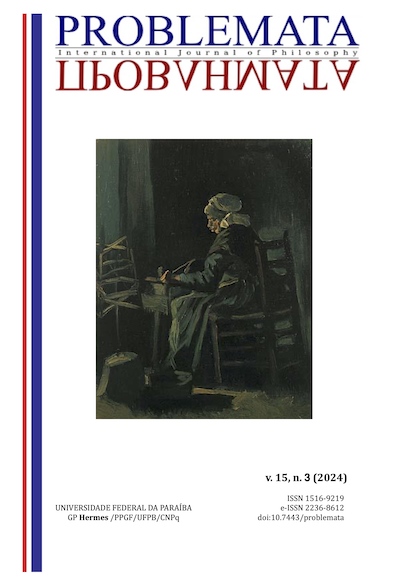BUSTER KEATON AND WITTGENSTEIN:
A LESSON ON LANGUAGE GAMES THROUGH THE FILM "THE GENERAL" (1927)
DOI:
https://doi.org/10.7443/problemata.v15i3.70007Keywords:
Cinema and Education, Teaching Philosophy, Language GamesAbstract
The Austrian philosopher Ludwig Wittgenstein is one of the greatest exponents of reflections on the Philosophy of Language in the 20th century. Through the concept of “language games”, the author explains the diversity of ways in which words are used in everyday life and that understandings of their meanings depend on the contexts and social practices in which they are used. Contrary to Russell's “logical atomism”, of which he was initially a supporter, in his work Philosophical Investigations, Wittgenstein (1999) showed that language does not submit to the rigors of Logic, but also presents itself under other rules shared by human coexistence, in addition to that their meanings are found in the different linguistic uses and forms of communication. In this sense, this article aims to elucidate the concept of “language games” through the film The General (1927), by Buster Keaton, using this work of silent cinema as a teaching resource in Philosophy classes for high school grades, mainly with the objective of “illustrating” that language is not limited to the logic of words, but is also expressed through other forms, “games” capable of promoting human communication.
Downloads
References
ALMEIDA, Jorge Miranda de. Diálogo entre a Filosofia e o Cinema. ALCEU . v. 15, n.30, p. 168 a 181, jan./jun. 2015. Disponível em: http://revistaalceu-acervo.com.puc-rio.br/media/Alceu%2030%20pp%20168%20a%20181.pdf. Acesso em 22 jan. 2024.
ALMEIDA, Rogério de. Cinema e Educação: fundamentos e perspectivas. Educação em Revista (UFMG), v. 33, p. 1-27, 2017. Disponível em: https://www.scielo.br/j/edur/a/kbqWpx6Vq6DszHrBT887CBk/abstract/?lang=pt. Acesso em 22 jan. 2024.
AMARAL, Murilo Garcia de Matos. Russell, Wittgenstein e o atomismo lógico. In: CARVALHO, Marcelo... [et al]. (Org.). Filosofia da linguagem e da lógica. São Paulo: ANPOF, 2015. p.35-43.
ANDREW, Geoff. A general (1927). In: SCHNEIDER, Steven Jay (Ed.). 1001 filmes para ver antes de morrer. Rio de Janeiro: Sextante, 2008. p. 60.
ARANHA, Maria Lúcia de Arruda; MARTINS, Maria Helena Pires. Filosofando: Introdução à Filosofia. São Paulo: Moderna, 2003.
BALLERINI, Franthiesco. História do cinema mundial. São Paulo: Summus, 2020.
BENJAMIN, Walter. A Obra de Arte na Era de Sua Reprodutibilidade Técnica. In. BENJAMIN, Walter. Magia e Técnica, Arte e política. Obras escolhidas I. Trad. Rouanet S. P. São Paulo: Brasiliense, 1994. p. 165-196.
CHAUÍ, Marilena. Iniciação à Filosofia. São Paulo: Ática, 2010.
COTRIM, Gilberto; FERNANDES, Mirna. Fundamentos de Filosofia. São Paulo: Saraiva, 2013.
D`ANGELO, Martha. Saber fazer Filosofia: pensadores contemporâneos. Aparecida: Ideias & Letras, 2011.
DOIMO, Diego Augusto; GEBRAN, Raimunda Abou. A Filosofia no Ensino Médio: o Cinema como recurso didático. Educação em Revista, Marília, v.19, n.1, p. 53-70, Jan.-Jun, 2018. Disponível em: https://revistas.marilia.unesp.br/index.php/educacaoemrevista/article/view/7901. Acesso em 22 jan. 2024.
FURTADO, Rita Márcia Magalhães. O cinema nos ensina? In: QUEIROZ, Fabrício David... [et al.]. (Org). Cinema e formação: concepções estéticas e pedagógicas. Campinas: Alínea, 2021. p. 53-62.
NAPOLITANO, Marcos. Como usar o cinema na sala de aula. São Paulo: Contexto, 2009.
RIBAS, Maria Alice Coelho; CENCI, Márcio Paulo. Filosofia e cinema: possíveis entrecruzamentos. Thaumazein, v.1, n.1, 2007, p.1-9. Disponível em: http://www.periodicos.unifra.br/index.php/thaumazein/article/view/193/pdf. Acesso em: 22 jan. 2024.
RUSS, Jacqueline. Filosofia: os autores, as obras. Petrópolis: Vozes, 2015.
STHEPENSON, Ralph; DEBRIX, Jean R. O cinema como arte. Rio de Janeiro: Zahar, 1969.
WITTGENSTEIN, Ludwig. Investigações filosóficas. Tradução de José Carlos Bruni. São Paulo: Nova Cultural, 1999. (Coleção Os pensadores).
YASHINISHI, Bruno José. O uso do cinema em aulas de Filosofia: roteiro didático para a aprendizagem de conceitos através de filmes. Ensino & Pesquisa, União da Vitória, v. 21, n.2, p. 251-263, abr./ago., 2023. Disponível em:https://periodicos.unespar.edu.br/index.php/ensinoepesquisa/article/view/7347/5630. Acesso em 27 jan. 2024.
Downloads
Published
Issue
Section
License
Copyright (c) 2024 Bruno José Yashinishi

This work is licensed under a Creative Commons Attribution 4.0 International License.
Authors who publish with this journal agree to the following terms:
- Authors retain copyright and grant the journal right of first publication with the work simultaneously licensed under a Creative Commons Attribution License that allows others to share the work with an acknowledgement of the work's authorship and initial publication in this journal.
- Authors are able to enter into separate, additional contractual arrangements for the non-exclusive distribution of the journal's published version of the work (e.g., post it to an institutional repository or publish it in a book), with an acknowledgement of its initial publication in this journal.
-
- Authors are permitted and encouraged to post their work online (e.g., in institutional repositories or on their website) prior to and during the submission process, as it can lead to productive exchanges, as well as earlier and greater citation of published work (See The Effect of Open Access).





